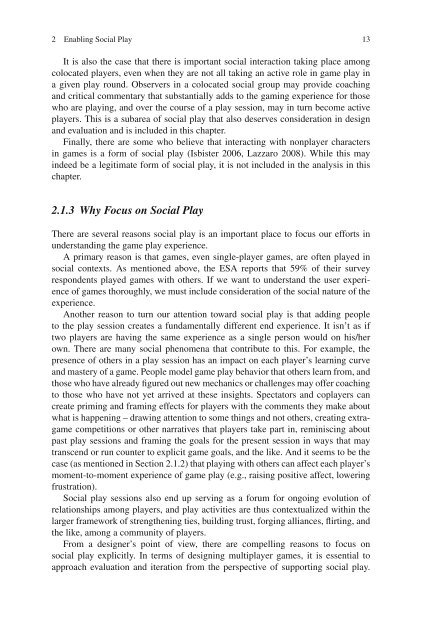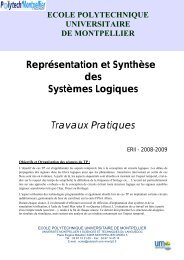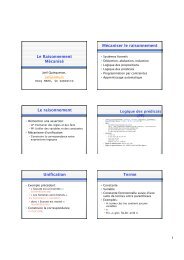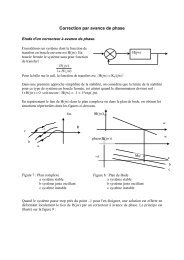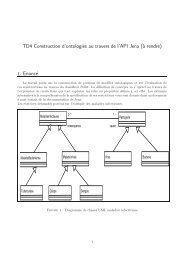Evaluating User Experience in Games: Concepts and Methods - Lirmm
Evaluating User Experience in Games: Concepts and Methods - Lirmm
Evaluating User Experience in Games: Concepts and Methods - Lirmm
Create successful ePaper yourself
Turn your PDF publications into a flip-book with our unique Google optimized e-Paper software.
2 Enabl<strong>in</strong>g Social Play 13<br />
It is also the case that there is important social <strong>in</strong>teraction tak<strong>in</strong>g place among<br />
colocated players, even when they are not all tak<strong>in</strong>g an active role <strong>in</strong> game play <strong>in</strong><br />
a given play round. Observers <strong>in</strong> a colocated social group may provide coach<strong>in</strong>g<br />
<strong>and</strong> critical commentary that substantially adds to the gam<strong>in</strong>g experience for those<br />
who are play<strong>in</strong>g, <strong>and</strong> over the course of a play session, may <strong>in</strong> turn become active<br />
players. This is a subarea of social play that also deserves consideration <strong>in</strong> design<br />
<strong>and</strong> evaluation <strong>and</strong> is <strong>in</strong>cluded <strong>in</strong> this chapter.<br />
F<strong>in</strong>ally, there are some who believe that <strong>in</strong>teract<strong>in</strong>g with nonplayer characters<br />
<strong>in</strong> games is a form of social play (Isbister 2006, Lazzaro 2008). While this may<br />
<strong>in</strong>deed be a legitimate form of social play, it is not <strong>in</strong>cluded <strong>in</strong> the analysis <strong>in</strong> this<br />
chapter.<br />
2.1.3 Why Focus on Social Play<br />
There are several reasons social play is an important place to focus our efforts <strong>in</strong><br />
underst<strong>and</strong><strong>in</strong>g the game play experience.<br />
A primary reason is that games, even s<strong>in</strong>gle-player games, are often played <strong>in</strong><br />
social contexts. As mentioned above, the ESA reports that 59% of their survey<br />
respondents played games with others. If we want to underst<strong>and</strong> the user experience<br />
of games thoroughly, we must <strong>in</strong>clude consideration of the social nature of the<br />
experience.<br />
Another reason to turn our attention toward social play is that add<strong>in</strong>g people<br />
to the play session creates a fundamentally different end experience. It isn’t as if<br />
two players are hav<strong>in</strong>g the same experience as a s<strong>in</strong>gle person would on his/her<br />
own. There are many social phenomena that contribute to this. For example, the<br />
presence of others <strong>in</strong> a play session has an impact on each player’s learn<strong>in</strong>g curve<br />
<strong>and</strong> mastery of a game. People model game play behavior that others learn from, <strong>and</strong><br />
those who have already figured out new mechanics or challenges may offer coach<strong>in</strong>g<br />
to those who have not yet arrived at these <strong>in</strong>sights. Spectators <strong>and</strong> coplayers can<br />
create prim<strong>in</strong>g <strong>and</strong> fram<strong>in</strong>g effects for players with the comments they make about<br />
what is happen<strong>in</strong>g – draw<strong>in</strong>g attention to some th<strong>in</strong>gs <strong>and</strong> not others, creat<strong>in</strong>g extragame<br />
competitions or other narratives that players take part <strong>in</strong>, rem<strong>in</strong>isc<strong>in</strong>g about<br />
past play sessions <strong>and</strong> fram<strong>in</strong>g the goals for the present session <strong>in</strong> ways that may<br />
transcend or run counter to explicit game goals, <strong>and</strong> the like. And it seems to be the<br />
case (as mentioned <strong>in</strong> Section 2.1.2) that play<strong>in</strong>g with others can affect each player’s<br />
moment-to-moment experience of game play (e.g., rais<strong>in</strong>g positive affect, lower<strong>in</strong>g<br />
frustration).<br />
Social play sessions also end up serv<strong>in</strong>g as a forum for ongo<strong>in</strong>g evolution of<br />
relationships among players, <strong>and</strong> play activities are thus contextualized with<strong>in</strong> the<br />
larger framework of strengthen<strong>in</strong>g ties, build<strong>in</strong>g trust, forg<strong>in</strong>g alliances, flirt<strong>in</strong>g, <strong>and</strong><br />
the like, among a community of players.<br />
From a designer’s po<strong>in</strong>t of view, there are compell<strong>in</strong>g reasons to focus on<br />
social play explicitly. In terms of design<strong>in</strong>g multiplayer games, it is essential to<br />
approach evaluation <strong>and</strong> iteration from the perspective of support<strong>in</strong>g social play.


